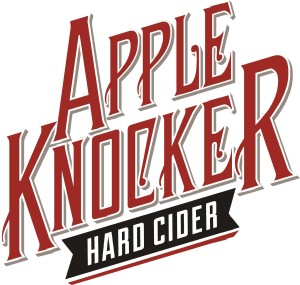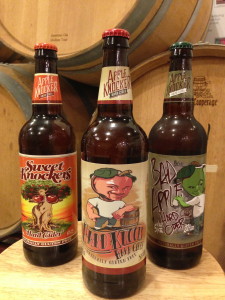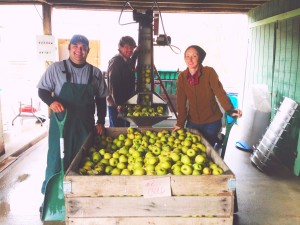It’s now March, and the phone interviews with cider makers for our upcoming book, The New American Cider Guide, are well underway. I don’t have to do too many truly “cold calls,” but with only one or two emails preceding, some calls are barely defrosted before that first ring. Yet the conversations themselves are decidedly warm and rewarding. I’m learning a lot about individual cider businesses and what makes cider makers tick.
That’s a good thing, because it will be many more interviews and a lot more writing before we achieve the reward of holding the finished book in our hands. But with several profiles behind us, we wanted to take a little peek at what it could be like.
Brad Genung from Apple Knocker Hard Cider was one of the first to reply to my interview request and to send me some photographs for our book. Using my write up of the interview and his photos, I’ve created a mock-up version of the Apple Knocker profile. Though I most likely will play with it a bit before print, I hope that you enjoy this preview.
Here it is, folks: Apple Knocker Profile for The New American Cider Guide . If you can’t open the pdf, here’s the content:
Surrounding areas once ridiculed the inhabitants of Cobden, Illinois, as rustic country bumpkins, or “apple knockers.” Full of gumption, working-class Cobden took ownership of that term by making Appleknockers its high school mascot. When the school made it to the state basketball finals in 1964, the “apple knockers” were fully transformed, from foolish to tenacious.
Modern-day apple knocker Brad Genung embodies that spirit of grit. He spent about five years developing Apple Knocker Hard Cider before selling his first production run of 6,000 gallons in 2012. Though Genung acknowledges “there’s a little bit of anxiety in every bottle,” he has reason to believe Apple Knocker will be a success; current production is up to 20,000 gallons, and the business has had to pull back distribution so that the supply can meet demand.
Currently Genung uses apples from local orchards, but Spring 2014 heralds the beginning of Apple Knocker’s own orchard with the planting of two acres, to be extended at the rate of an acre a year. The trees will all be trellised in a similar fashion to his wine grape vineyards. The dense spacing—every 8 feet on 12 foot centers for a total of 460 trees per acre—is made possible because all of the trees are grafted onto dwarf rootstock.
Genung believes that there are three main approaches to making cider. Beer brewers who decide to go into cider focus on big, bold flavors; traditional cider makers use “beautiful, wonderfully tannic apples” to create ciders with depth and complexity; and winemakers make cider the way they make good white wine, by focusing on fresh fruit character. Genung, who has owned Owl Creek Vineyard since 1995, takes the vintner’s approach. On first impression, this may come as a surprise; Apple Knocker is sold in 22 oz. bombers with a label that’s reminiscent of craft brewing. But part of what drew Genung to cider is the convivial culture that surrounds it, and he worried that wine bottles would align his product with wine’s serious and restrictive image. Genung wanted his packaging to reflect the “free expression” phase that cider is currently in.
Brad Genung’s experimentation has resulted in a core trio: Hard Knocks, Bad Apple, and Sweet Knockers. So far, he’s proudest of Hard Knocks, which is a semi-dry cider. He ferments it to dryness using Belgian yeasts, and then adds back apple juice for a touch of sweetness. He describes it as having some citrus and sour flavors, with a light oak character on the finish. He’s also working on developing a dry hopped cider; by using Cascade hops at cooler temperatures, he hopes to imbue only a light hoppiness to the cider, complementing the flavor of the apples. Even when borrowing techniques from the beer brewing tradition, he’s looking for “the clearest expression of the apple.”
“It’s delicate, and it’s ethereal, like the great moments in life. You pick up these subtleties that you appreciate so wonderfully, and then it’s all gone. It’s like the really defining moments in life that you always harken back to, that’ll put a smile on your face to make you happy. That’s what enjoying a good cider should be like.”
Photo: Brad Genung stands behind dock crushing crew Tim and Karin with about-to-be-pressed cider apples. The apples are pressed cold to inhibit any wild yeasts or red wine yeasts that might be present, without having to add sulfites.


